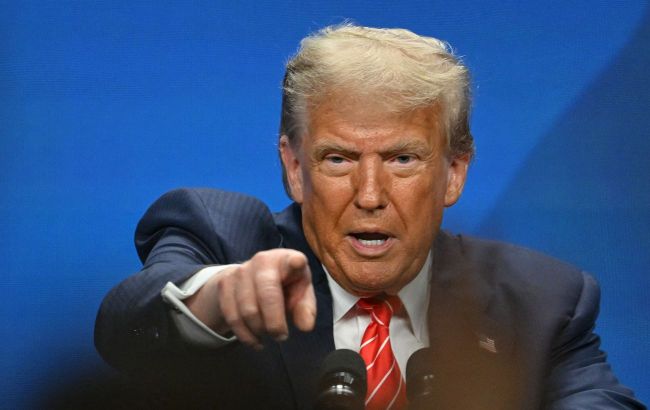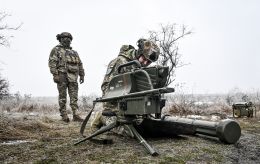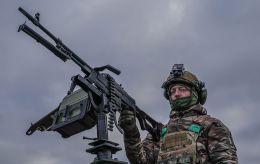Behind Trump's decision to arm Ukraine: Reuters insiders warn of hidden risks
 Photo: Trump decided to give Ukraine European weapons (Getty Images)
Photo: Trump decided to give Ukraine European weapons (Getty Images)
US President Donald Trump has finally found a way to arm Ukraine: ask European allies to hand over their weapons and buy American ones in return. Now comes the hard part - agreeing on who will transfer the valuable weapons, including Patriot systems, reports Reuters.
“We're going to make top-of-the-line weapons, and they'll be sent to NATO,” Trump said in the Oval Office on July 14. Trump added that some of the Patriot missile defense systems will arrive in Ukraine “within days.”
The expensive Patriot systems, which are in high demand among US allies, have proven effective in destroying Russian ballistic missiles targeting Ukrainian cities.
According to a Reuters source familiar with the situation, the United States has also expressed its readiness to send additional offensive weapons as part of a proposed deal with European allies, although Trump has said that Ukraine should refrain from striking Moscow.
According to two sources familiar with the discussions, the plan that Trump and NATO Secretary General Mark Rutte have developed in recent days has been well received by Ukraine and its allies.
Leaders in Kyiv and elsewhere welcomed the significant change in tone from Trump, who until recent weeks had spoken admiringly of Vladimir Putin.
But after this statement, it became clear that Trump presented only a framework, not a specific plan. How substantial the support for Ukraine will be will depend on future negotiations on who will provide what equipment, according to 10 officials in the United States and Europe.
"As always with these things, the devil is in the details," said the ambassador of a Nordic country in Washington.
The main question is who will hand over the Patriot batteries and when.
Patriot systems
During his meeting with Trump in the Oval Office, Rutte mentioned six NATO countries - Finland, Denmark, Sweden, Norway, the Netherlands, and Canada - that are ready to participate in the weapons procurement scheme.
Senior sources at the embassies of two of these countries in the United States told Reuters that they personally learned of the plan immediately after it was announced. Even close US allies appear to have learned of the proposal in real time.
"It is my clear sense that nobody has been briefed about the exact details in advance, and I also suspect that internally in the administration they are only now beginning to sort out what it means in practice," said another European ambassador.
Kurt Volker, former US Ambassador to NATO, said that Trump has found a way to balance support for Ukraine with the political realities of the Republican Party. According to him, the fact that European allies will guarantee the supply of weapons to the United States is completely consistent with what Trump said during the campaign.
Throughout the campaign, Trump said that he would push European countries to increase defense spending, which drew thunderous applause from the MAGA-supporting public. "You gotta pay," he said. "If they're not going to pay, we're not going to protect, ok?"
Volker said that Ukraine could eventually receive 12 to 13 Patriot batteries, but that it could take a year to fully deliver them.
Asked to comment on the situation, a NATO spokesperson said that the defense alliance would coordinate the delivery of weapons through a mechanism known as the NATO Security Assistance and Training for Ukraine, a NATO mission based in Germany that is responsible for coordinating Western military assistance to Kyiv.
"Several European countries have already committed to support this initiative including Germany, Norway, Denmark, the Netherlands, Sweden, the United Kingdom, Canada and Finland," the official said. "Details are still under discussion."
According to two US officials, Trump's sharp escalation of rhetoric toward Moscow in recent weeks has come amid a growing belief that Putin is not negotiating in good faith.
"At a certain point, you know, ultimately talk doesn't talk. It's got to be action. It's got to be results," Trump said during his meeting with Rutte.
One of the officials said that Trump has realized that Putin's ambitions go beyond Crimea and the four eastern regions of Ukraine, as Kyiv and its European allies have repeatedly publicly stated.
Three Russian sources close to the Kremlin said that Putin would not end the war under Western pressure and believes that Russia, which has survived the toughest sanctions imposed by the West, is capable of overcoming further economic difficulties, including Trump's threat to impose US tariffs on Russian oil buyers.
Now, according to three US officials, the real work begins.
Currently, US officials are talking to NATO allies and assessing who is willing to send what cargo to Ukraine. European officials have generally been understanding.
"We are ready to participate," said Danish Foreign Minister Lars Rasmussen on Tuesday before a meeting of EU ministers.
One official named Germany, Greece, the Netherlands, and Spain as good candidates to send a Patriot battery to Kyiv because either they have multiple batteries or the threats they face are relatively unlikely.
Some of them, such as Greece and Spain, have previously rejected calls from allies to transfer some of their Patriot systems to Ukraine, arguing that they are needed to protect their own countries and NATO as a whole.
Trump's attempt to take credit for additional arms shipments to Ukraine has caused some tension in Europe.
“If we pay for these weapons, it's our support,” EU Foreign Policy chief Kaja Kallas said after the meeting in Brussels, adding that she welcomed Trump's decision.
"So it's European support, and we are doing as much as we can to help Ukraine ... If you promise to give the weapons, but say that somebody else is going to pay for it, it's not really given by you, is it?"
One official said the Trump administration is looking at NATO's inventory to determine what is available. The next attempt is to convince the allies to give the equipment to Ukraine in exchange for some kind of trade, the official added.
The deal could cover a variety of options, including waiving future acceptance of a piece of military equipment under the Foreign Military Sales program or sending ammunition to Ukraine in exchange for an earlier replenishment date.
Trump told reporters that one country has 17 Patriot systems, some of which will be sent directly to Ukraine.
According to US and European officials, this figure caused general confusion among European allies and on Capitol Hill, many of whom were not informed.
No NATO member other than the United States has that many Patriot systems, two sources with knowledge of the matter said, prompting speculation that Trump may have been referring to specific Patriot components, such as launchers or missiles.
German Defense Minister Boris Pistorius, who visited the Pentagon on Monday, said that Germany will discuss sending Patriot batteries to Ukraine with the United States in the coming days or weeks. However, he said no Patriot system will arrive in Kyiv for several months, likely pushing the delivery to the end of the tactically important summer months.
Another official said that Trump is directly involved in the negotiations, though the talks are “squishy” so far.
"So far folks have said, 'We can help,'" that official said. "Now, what that means, we don't know."
On July 14, the United States and NATO agreed on which American weapons would be supplied to Ukraine for $10 billion, with European partners covering the costs.
US President Donald Trump has already said that the first Patriot missiles are being shipped to the allies, which means that Ukraine will soon receive them.

